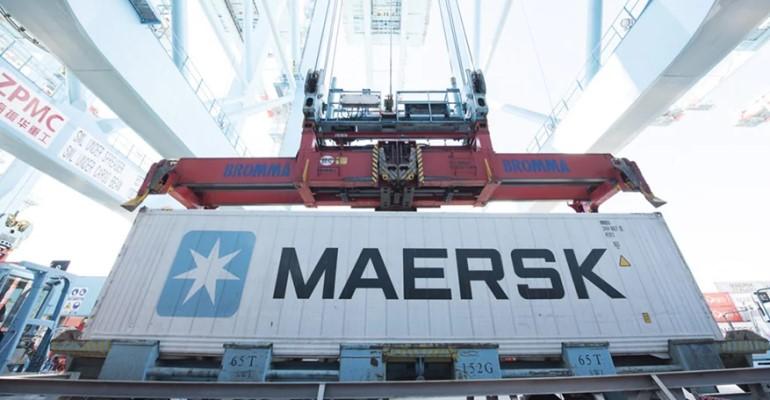Of the top ten major shipping lines the only two that have aimed for integrated services have been CMA CGM and Maersk with both carriers having invested heavily in new acquisitions including in air cargo and logistics.
During the pandemic as profits skyrocketed the questions surrounding whether the shift of container lines into the logistics sphere became muted, after all business was booming.
A return to some sort of normality with rates and revenues crashing back to pre-pandemic levels has seen the uncertainties surrounding whether the integrated strategy is a viable option for shipping lines has re-emerged.
Analysts Linerlytica questioned the strategy, focusing on Maersk’s ‘poor’ performance, following the publication of its second quarter results.
“Maersk’s failure to protect its liner market share in the last three years has cost it dearly, as it gave up at least $4bn in foregone profits that Maersk would have been able to generate if it had maintained its global capacity share at 18% instead of the current 15.5%,” Tan Hua Joo, an analyst at Linerlytica wrote.
Maersk’s $10.5bn investment in its logistics business has generated an EBIT of just $115m a pre-tax return of just 1.1%, which does not compare with its ocean and terminals businesses.
“The dismal performance of Maersk’s logistics business pales in comparison to its liner and terminal segments, both of which have received little or no new capital investments in the last three years.
“The Ocean business generated EBIT earnings of $1.2bn on invested capital of $29bn for a 4.1% ROIC, while its Terminals recorded EBIT earnings of $269m on invested capital of $7.8bn for a ROIC of 3.4%,” said Tan.
Maersk’s Q2 returns saw its ocean activities record earnings of $2.25bn, down from $9.59bn in Q2 2022, while its logistics income fell from $337m to $311m. CMA CGM recorded similar Q2 results with shipping earnings declining to $2.18bn from $9.12bn; while the company’s logistics division recorded a fall of $16m to $340m year-on-year.
Meanwhile, competitor line Ocean Network Express (ONE), which has not opted for the integrated carrier strategy, saw EBITDA make similar declines. It’s Q1 EBITDA (ONE’s financial year starts in April) crashed to $770m from last year’s $5.089bn, down 87%.
Listen to a podcast on the outlook for container shipping
As revenues from all the major carriers are seemingly falling it seems difficult to make a definitive statement about the success or failure of Maersk’s, and indeed CMA CGM’s, integrated carrier strategy.
Mark McVicar, a former container shipping analyst at a major financial institution told Seatrade Maritime News, “It’s too early to judge the process, we need another two to three years from here at least to see how this pans out.”
According to McVicar the $64 million question is whether the ocean segment of the Maersk business can offer protection to the other divisions of the company as they are integrated.
He added, “You have to see if the customers remain loyal to Maersk because of all the other things that they are doing for them. The financial markets don’t buy it yet, but neither do shippers, there’s no definitive answer.”
Moreover, the days of being a market leader in volumes are gone, Maersk will not care that MSC has overtaken its as the largest shipping line. “Maersk has to maintain a scale that gives it a competitive unit cost,” that is the first element of the Maersk plan explains McVicar.
The second element is to target the high yield value added and “complicated cargoes” such as LCL and reefer.
These offer the best yield opportunities in the build-out phase of the carrier’s transition to an integrated supply chain operator.
McVicar pointed out that when Deutsche Poste took over various companies in around 2008/09 there was a cynical reaction from the market, with the company’s share price falling from $43 to just $9, “now it’s back in the mid-$40s,” he said, “The returns are not very visible but the carriers won’t change strategy,” he added.
Seatrade Maritime News asked Maersk to comment on the criticisms levelled at the company’s strategy by Tan and Maersk referred to CEO Vincent Clerc’s statement following the release of the company’s Q2 results on 4 August.
Clerc said then that customers are lowering their inventories following a period of high sales during the pandemic, “this implies a very different trading environment”. He said it is critical for Maersk to manage its costs very tightly in this period.
“The supply chain disruptions seen in the last couple of years may have abated, but the underlying vulnerabilities in supply chains are still there and need to be addressed. We are, therefore, unwavering in our commitment to continue to invest into building AP Moller Maersk into an integrator of container logistics, increasing the resilience of customers’ supply chains.”
Copyright © 2024. All rights reserved. Seatrade, a trading name of Informa Markets (UK) Limited.
Add Seatrade Maritime News to your Google News feed.  |

